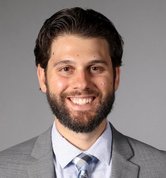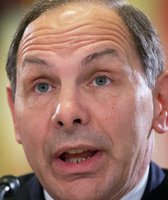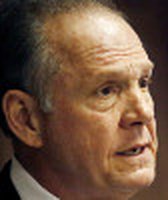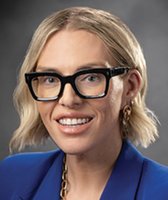Stand up for the facts!
Our only agenda is to publish the truth so you can be an informed participant in democracy.
We need your help.
I would like to contribute
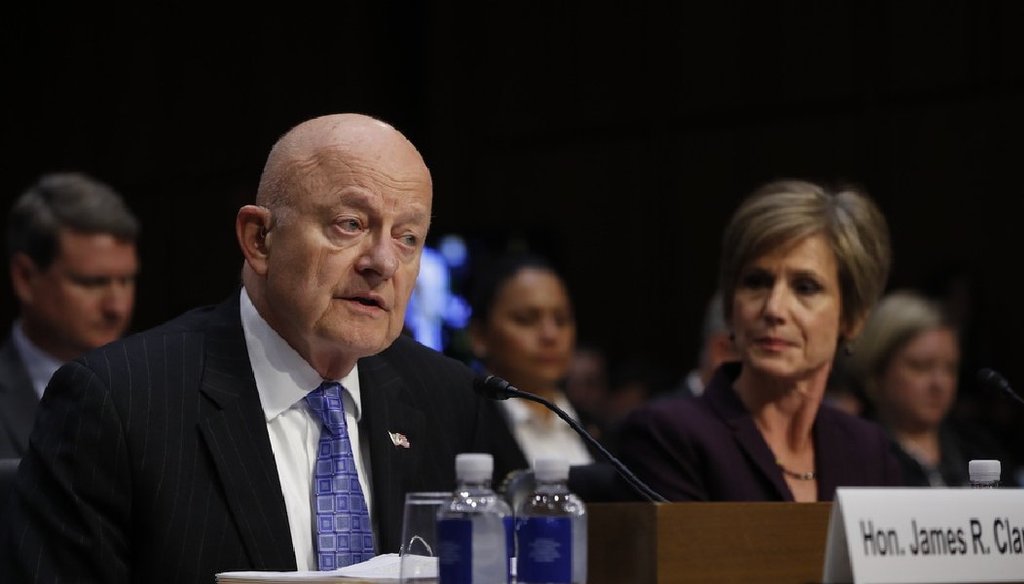
Director of National Intelligence James Clapper. (2014 AP Photo)
It was an exchange made famous not because of what was said at the time, but because of what Americans discovered later.
At the tail end of a rare open session of the Senate Intelligence Committee on March 12, 2013, Sen. Ron Wyden, D-Ore., asked National Intelligence Director James Clapper whether intelligence officials collect data on Americans.
Clapper responded "No, sir," and, "Not wittingly."
In the following months, a series of news stories fueled by leaks from former National Security Agency contractor Edward Snowden revealed that wasn’t the case. Reports showed the government was collecting and storing bulk metadata of American phone records, and had methods for capturing a vast amount of email and Internet data as well.
A year later, Clapper’s testimony represents one of the great, and unfortunate, holes in timely fact-checking. The challenge in discerning whether those with privileged information, particularly on matters of national security, are speaking truthfully in public is a difficult, if not impossible, task.
But in the aftermath of the Snowden leaks and the ongoing conversation on balancing privacy with security, we wanted to review exactly what transpired a year ago with the hindsight history has provided.
The transcript
On March 12, 2013, Clapper appeared before the U.S. Select Committee on Intelligence in his role as national intelligence director, a position created in 2004 to oversee foreign, military and domestic intelligence for national defense. The committee’s role is to oversee intelligence operations of the executive branch, and its members have special access to classified intelligence briefings, sources and budgets.
U.S. Sen. Ron Wyden, D-Ore., was one of the last senators to ask questions during the open portion of the committee hearing, before it went to a closed session.
Wyden: "I hope we can do this in just a yes or no answer, because I know Sen. Feinstein wants to move on. Last summer, the NSA director (Keith Alexander) was at a conference and he was asked a question about the NSA surveillance of Americans. He replied, and I quote here, ‘The story that we have millions, or hundreds of millions, of dossiers on people is completely false.’ The reason I’m asking the question is, having served on the committee now for a dozens years, I don’t really know what a dossier is in this context. So, what I wanted to see if you could give me a yes or no answer to the question: Does the NSA collect any type of data at all on millions, or hundreds of millions of Americans?"
Clapper: "No, sir."
Wyden: "It does not?"
Clapper: "Not wittingly. There are cases where they could inadvertently, perhaps, collect, but not wittingly."
Wyden: "All right. Thank you. I’ll have additional questions to give you in writing on that point, but I thank you for the answer."
And that was it. Clapper’s response garnered almost no reaction in the immediate aftermath.
The Snowden effect
That changed on June 5 and 6. Using information leaked by Snowden, The Guardian and The Washington Post released the first in a series of stories that would highlight how the NSA collected metadata from phone companies on calls made by U.S. citizens. Included in the bulk data was who called whom, for how long and when. Subsequent stories showed that Internet data was being collected under different programs.
The information is used to monitor suspected terrorists. If someone corresponds with a suspect, intelligence agencies can then look at their interactions with other people. In rare cases, a warrant is provided for a wiretap to listen to calls.
The discrepancy between this information and Clapper’s testimony was quickly noted.
Wyden said Clapper didn’t give a "straight answer" during the hearing, even though Wyden submitted his question in advance. Wyden said he wouldn’t have asked the question if Clapper’s staff had asked him not to.
In the days after the hearing, Wyden said he asked Clapper’s staff to clear the record, but they declined to do so publicly until after the Snowden leaks.
For his part, Clapper first stood by his comments. On June 6, he told the National Journal, "What I said was, the NSA does not voyeuristically pore through U.S. citizens' emails. I stand by that," Clapper said. (As the actual exchange shows, Clapper never mentioned email.)
Two days later, in an interview with NBC, Clapper further explained that he found himself in a difficult position when confronted with Wyden’s question.
"I thought though in retrospect I was asked (a) ‘when are you going to stop beating your wife’ kind of question, meaning not answerable necessarily, by a simple yes or no," he said. "So I responded in what I thought was the most truthful, or least most untruthful manner, by saying, ‘No.’"
Clapper later admitted he made a mistake. In a letter to the committee’s chair, Sen. Dianne Feinstein, D-Calif., Clapper contended that he thought Wyden was was referring to something other than the phone metadata program, one that targets foreigners. Under that program, Clapper contended, his characterization that American data would only be collected through "inadvertent" means, would be correct.
But he admitted his answer, as stated, was wrong.
"My response was clearly erroneous," he wrote.
President Barack Obama, too, in an interview with CNN said Clapper should have been more careful, but added, "He had a classified program that he couldn't talk about and he was in an open hearing in which he was asked, he was prompted to disclose a program, and so he felt that he was caught between a rock and a hard place."
The debate goes on
Clapper’s explanation continues to bother Wyden a year later. Wyden told PolitiFact this week that this isn’t an isolated incident, citing the comments from NSA head Alexander he referenced in last year’s hearing.
"It’s very hard to misinterpret the question," Wyden said. "But let’s give somebody some slack if you want to. I don’t find that credible, but let’s say somebody does. What’s more troubling is after the hearing was over, they made a conscious and deliberate decision not to correct the record."
"They chose to make these statements in public that weren’t accurate," Wyden added. "They could have declined to answer the question in an open hearing. They have declined to answer questions in an open hearing before. At that hearing, he declined to answer other questions."
Some criticize Wyden for asking the question in the first place. As a member of the intelligence committee, Wyden clearly knew the answer already and that he was dealing with classified information. Yet he asked anyway.
"Putting a man in a position of either lying to Congress or disclosing national security secrets, the fault there was with the senator, not with Clapper," said Bob Turner, associate director of the Center for National Security Law at the University of Virginia. "Clapper has a duty to protect secrets. I don’t see that as covering it up or lying to the American people. It was to keep enemies from knowing our capabilities."
Wyden said he asked because "I’m not doing my job if the intelligence leadership says different in public what they say in private."
We also found differing opinions on whether Clapper could have chosen not to answer the question in the moment.
Elizabeth Goitein, co-director of the Liberty and National Security Program at New York University Brennan Center for Justice, said intelligence officials often defer to answer confidential questions until executive session. Clapper could have as well.
In his opening statement, Clapper even acknowledged as much, saying it’s "not to evade but rather protect."
"An open hearing on intelligence matters is something of a contradiction in terms," he said.
Turner, though, said such an answer, "translates into, ‘Oh yes, but I wish you wouldn’t ask the question’" for anyone who is watching, including the enemy.
Turner, who previously worked on intelligence issues in the Senate, the White House and State Department over several decades, also contends that framers of the U.S. Constitution deliberately gave the president powers to deal with foreign and military affairs, including in secret, without congressional interference. Forcing intelligence officials to testify in public could risk lives and make obsolete important surveillance programs if certain information comes out, he said.
While that might be true, Goitein said it does not excuse Clapper from an inaccurate answer.
"Anyone who happened to be watching the hearing had no reason to doubt the answer," she said. "The incident is generally framed in terms of whether Clapper mislead Congress. ... But he couldn’t have mislead members of the intelligence committee because they knew what was going on. The people who were misled were the American public."
Our Sources
Phone interview with Sen. Ron Wyden, March 11, 2014
Phone interview with Bob Turner, associate director of the Center for National Security Law at the University of Virginia, March 11, 2014
Phone interview with Elizabeth Goitein, co-director of the Brennan Center’s Liberty and National Security Program at New York University School of Law, March 10, 2014
Office of Sen. Ron Wyden, "Secret Law," accessed March 11, 2014
Email interview with Shawn Turner, spokesman for the Office of National Intelligence Director, March 11, 2014
Washington Post, "Sen. Wyden: Clapper didn’t give ‘straight answer’ on NSA programs," June 11, 2013
Das Beste am Norden, "Snowden Interview: Transcript," Jan. 26, 2014
Transcript of U.S. Select Committee on Intelligence, March 12, 2014
National Journal, "Everything We Learned From Edward Snowden in 2013," Dec. 31, 2013
Letter from National Intelligence Director James Clapper to Sen. Ron Wyden, July 26, 2013
Letter from National Intelligence Director James Clapper to Sen. Dianne Feinstein, Jun. 21, 2013
Forbes, "National Intelligence Director Clapper Apologizes For 'Clearly Erroneous' Congressional Testimony On NSA Surveillance," July 2, 2013
National Journal, "James Clapper Clarifies Remarks Over NSA Snooping," June 6, 2013
The Hill, "Obama: Clapper ‘should have been more careful’ in congressional testimony," Jan. 31, 2014
Office of the National Intelligence Director, Director James R. Clapper interview with Andrea Mitchell, June 8, 2013
